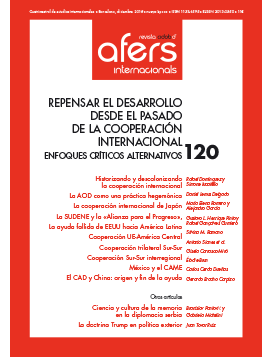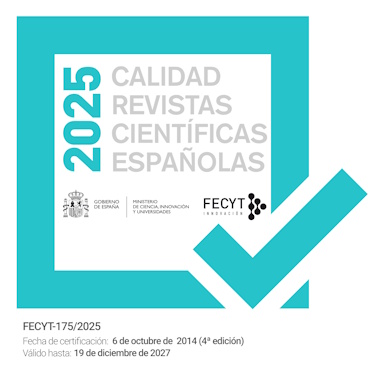The science and culture of memory in Serbian diplomacy
Keywords:
culture, memory, diplomacy, science, global challenges, Second World War, Serbia, international relationsAbstract
Revista CIDOB d’Afers Internacionals, nº 120
Quadrimestral (October-December 2018)
ISSN:1133-6595 | E-ISSN:2013-035X
DOI: doi.org/10.24241/rcai.2018.120.3.241
Scientists’ participation in foreign policy strategies fill very few pages in the studies of the international relations of non-hegemonic countries. This text analyses a case study of the science diplomacy of Serbia – a small non-hegemonic country without considerable resources – in the context of the culture of memory as a global challenge. First of all, certain concepts are introduced to interpret the relationship between science and diplomacy; second, the case is described and analysed and the mechanisms of articulation are presented that allow the plausible operability of science diplomacy as a shared space for the consolidation of foreign policy strategies; finally, an evaluation and conclusions are offered.
>> The full text articles of this issue are available only in Spanish language
References
Albornoz, Mario (coord.). Manual de Santiago. Manual de indicadores de internacionalización de la ciencia y la tecnología. Buenos Aires: Red de Indicadores Iberoamericanos de Ciencia y Tecnología y RICYT, 2009 (en línea) [Fecha de consulta: 10.10.2017] http://www.ricyt.org/manuales/doc_view/1-manualde-santiago
Azpíroz, María Luisa. Diplomacia pública: el caso de la “guerra contra el terror”. Barcelona: Editorial UOC, 2012.
Bokser Liwerant, Judit. «Globalization, Transnationalism, Diasporas: Facing New Realities and Conceptual Challenges». En: Wieviorka, Michel (ed.). Laurent Lévi-Strauss and Gwenaelle Lieppe, Penser Global. Paris: FMSH Editions, p. 309-336.
Copeland, Daryl. «Science Diplomacy for the Age of Globalization». USC Center on Public Diplomacy Blog, (22 de junio de 2016) (en línea) [Fecha de consulta: 01.09.2017] http://uscpublicdiplomacy.org/blog/science-diplomacyage-globalization
Cull, Nicholas. Public Diplomacy: Lessons from the Past. Los Angeles: Figueroa Press, 2009.
Diner, Dan. «Restitution and Memory: The Holocaust in European Political Cultures». New German Critique, n.° 90 (2003), p. 36-44.
Dolan, Bridget M. «Science and Technology Agreements as Tools for Science Diplomacy: a U.S. Case Study». Science and Diplomacy, vol. 1, n.° 4 (2012) (en línea) [Fecha de consulta: 01.09.2017] http://www.sciencediplomacy.org/article/2012/science-and-technology-agreements-tools-for-science-diplomacy
Fähnrich, Birte. «Science Diplomacy: Investigating the Perspective of Scholars on Politics–Science Collaboration in International Affairs». Public Understanding of Science, vol. 26, n.° 6 (2017), p. 688-703.
Flink, Tim y Schreiterer, Ulrich. «Science diplomacy at the intersection of SyT policies and foreign affairs: toward a typology of national approaches». Science and Public Policy, vol. 37, n.° 9 (2010), p. 665-677.
Gluckman, Peter. «Science Advice to Governments: An Emerging Dimension of Science Diplomacy». Science and Diplomacy, vol. 5, n.° 2 (2016) (en línea) [Fecha de consulta: 01.09.2017] http://www.sciencediplomacy.org/article/2016/science-advice-governments
Greif, Gideon; Lituchy, Barry; Ćirić, Jovan y Radojičić, Dragana. «The archival material of Ministry of Foreign Affairs of the Republic of Serbia in the service of fostering the right to non-oblivion: Ante Pavelić in Argentina». Collection of papers 31: The Right to Remembrance (legal and anthropological aspects of culture of remembrance оf the victims of Independent State of Croatia in WWII). Ethnographic Institute of SASA; Institute for Comparative Law, 2017.
Held, David. «Cosmopolitanism: globalisation tamed?». Review of International Studies, vol. 29, (2003), p. 465-480.
Henrikson, Alan K. «Ten Types of Small State Diplomacy». Masaryk University, (2008) (en línea) [Fecha de consulta: 27.12.2017] https://is.muni.cz/el/1423/podzim2008/MVZ157/um/TEN_TYPES_OF_SMALL_STATE_DIPLOMACY.pdf
Huijgh, Ellen «Changing Tunes for Public Diplomacy: Exploring the Domestic Dimension». Exchange: The Journal of Public Diplomacy- Facets of Diplomacy, vol. 2, n.° 1 (2013), p. 62-73.
International Holocaust Remembrance Alliance (IHRA). «Sitio web oficial». IHRA, (en línea) [Fecha de consulta: 01.04.2018] https://www.holocaustremembrance.com
Jazbec, Milan. «Small States and Diplomacy: An Indispensable, though Much Diversified Relation». Halduskultuur - Administrative Culture, vol.11, n.° 1 (2010), p. 66-83.
Leonard, Mark. «Diplomacy by Other Means». Foreign Policy, (1 de Septiembre de 2002) (en línea) [Fecha de consulta: 13.11.2017] http://www.foreignpolicy.com/articles/2002/09/01/diplomacy_by_other_means
Melissen, Jan. Wielding Soft Power: The New Public Diplomacy. La Haya: Netherlands Institute of International Relations Clingendael, 2005.
Ministry of Foreign Affairs of the Republic of Serbia. «Address delivered by First Deputy Prime Minister and Minister of Foreign Affairs Ivica Dacic on the occasion of 100th anniversary of allied relations between the Serbs and Jews and between the Serbs and Americans in the First World War». Ministry of Foreign Affairs of the Republic of Serbia, (13 de abril de 2018) (en línea) [Fecha de consulta:
04.2018] http://www.mfa.gov.rs/en/press-service/statements/17664-addressdelivered-by-first-deputy-prime-minister-and-minister-of-foreign-affairs-ivicadacic-on-the-occasion-of-100th-anniversary-of-allied-relations-between-the-serbs-and-jews-and-between-the-serbs-and-americans-in-the-first-world-warMinistry of Foreign Affairs of the Republic of Serbia «The International Holocaust Remembrance Alliance».
Ministry of Foreign Affairs of the Republic of Serbia, Foreign Policy, Multilateral Issues (s/a). (en línea) [Fecha de consulta: 20.04.2018] http://www.mfa.gov.rs/en/foreign-policy/multilateral-issues/task-force-for-international-cooperation-on-holocaust-education-remembrance-and-research
Morgenthau, Hans. Politics Among Nations: The struggle for Power and Peace. Nueva York: Alfred A. Knopft, 1975.
Navarro, Diego. Imagen turística argentina: política turística como política exterior. Mendoza: Universidad del Aconcagua, 2010.
Nye, Joseph. Soft Power: The Means to Success in World Politics. New York: Public Affairs, 2004.
OCDE. «The OECD Innovation Strategy. Getting a Head Start on Tomorrow». OECD iLibrary, (mayo de 2010), p. 165-188 (en línea) [Fecha de consulta: 10.10.2017] http://dx.doi.org/10.1787/9789264083479-en
Proedrou, Filippos y Frangonikolopoulos, Christos. «Refocusing Public Diplomacy: The Need for Strategic Discursive Public Diplomacy». Diplomacy and Statecraft, vol. 23, n.° 4 (2012), p. 728-745 (en línea) [Fecha de consulta: 10.10.2017] http://dx.doi.org/10.1080/09592296.2012.736339
Riordan, Shaun «Stop Inventing “New Diplomacies”». USC Center on Public Diplomacy, CPD Blog, (21 de noviembre de 2017) (on line) [Fecha de consulta: 07.09.2017) https://uscpublicdiplomacy.org/blog/stop-inventing-newdiplomacies
Saddiki, Said. «El papel de la diplomacia cultural en las relaciones internacionales». CIDOB d’Afers Internacionals, n.° 88 (2009), p. 107-118.
Santacreu, Ana María «Innovation, diffusion, and trade: Theory and measurement». Journal of Monetary Economics, vol. 75, (2015), p. 1-20.
The Royal Society’s Science Policy Centre. New frontiers in science diplomacy: Navigating the changing balance of power. Londres: The Royal Society, 2010.
UNESCO «Memoria del Mundo: Directrices para la salvaguarda del patrimonio universal». División de la Sociedad de la Información. Organización de las Naciones Unidas para la Educación, la Ciencia y la Cultura, (febrero de 2002) p. 1-62 (en línea) [Fecha de consulta: 12.10.2017] http://unesdoc.unesco.org/images/0012/001256/125637s.pdf
UNESCO. «Comunicado de la Conferencia Mundial sobre la Educación Superior: La nueva dinámica de la educación superior y la investigación para el cambio social y el desarrollo». UNESCO, (8 de julio de 2009) (en línea] [Fecha de consulta: 2.11.2017] http://www.unesco.org/education/WCHE2009/comunicado_es.pdf
UNESCO «Science report. Towards 2030». UNESCO (noviembre de 2015) (en línea) [Fecha de consulta: 12.10.2017] http://unesdoc.unesco.org/images/0023/002354/235407e.pdf
Unión Europea. «Lund Declaration, “Europe Must Focus on the Grand Challenges of our Time”». Swedish EU Presidency, Lund, Suecia (julio de 2009) (en línea) [Fecha de consulta: 12.10.2017] https://era.gv.at/object/document/130
Unión Europea. «Lund revisited. Tackling societal changes». Swedish Research Council, (diciembre 2015) (en línea) [Fecha de consulta: 12.10.2017] https://www.vr.se/download/18.43a2830b15168a067b9dac74/1454326776513/The+Lund+Declaration+2015.pdf
Valen, Federico. «¿Estamos ante un “giro poscompetitivo” en la política de ciencia, tecnología e innovación?». Sociologías, vol. 18, n.° 41 (2016), p. 242-268.
Waldman, Gilda. «La “cultura de la memoria”: problemas y reflexiones». Política cultural, vol. 26, 2006. p. 11-34 (en línea) [Fecha de consulta: 14.03.2017]. http://www.scielo.org.mx/scielo.php?script=sci_arttext&pid=S0188-77422006000200002&lng=es&nrm=iso>. ISSN 0188-7742













